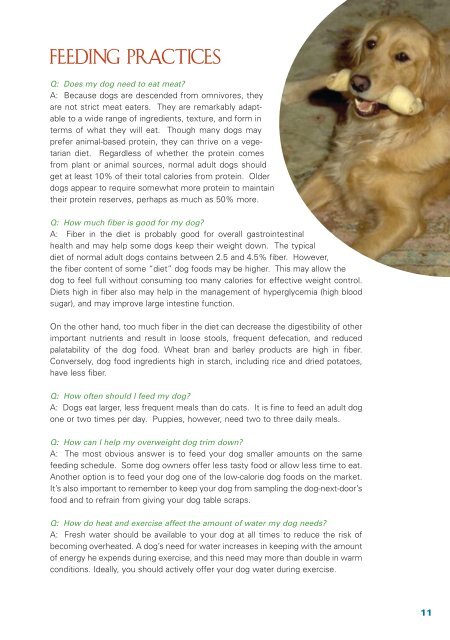dog_nutrition_final_fix
You also want an ePaper? Increase the reach of your titles
YUMPU automatically turns print PDFs into web optimized ePapers that Google loves.
FEEDING PRACTICES<br />
Q: Does my <strong>dog</strong> need to eat meat?<br />
A: Because <strong>dog</strong>s are descended from omnivores, they<br />
are not strict meat eaters. They are remarkably adaptable<br />
to a wide range of ingredients, texture, and form in<br />
terms of what they will eat. Though many <strong>dog</strong>s may<br />
prefer animal-based protein, they can thrive on a vegetarian<br />
diet. Regardless of whether the protein comes<br />
from plant or animal sources, normal adult <strong>dog</strong>s should<br />
get at least 10% of their total calories from protein. Older<br />
<strong>dog</strong>s appear to require somewhat more protein to maintain<br />
their protein reserves, perhaps as much as 50% more.<br />
Q: How much fiber is good for my <strong>dog</strong>?<br />
A: Fiber in the diet is probably good for overall gastrointestinal<br />
health and may help some <strong>dog</strong>s keep their weight down. The typical<br />
diet of normal adult <strong>dog</strong>s contains between 2.5 and 4.5% fiber. However,<br />
the fiber content of some “diet” <strong>dog</strong> foods may be higher. This may allow the<br />
<strong>dog</strong> to feel full without consuming too many calories for effective weight control.<br />
Diets high in fiber also may help in the management of hyperglycemia (high blood<br />
sugar), and may improve large intestine function.<br />
On the other hand, too much fiber in the diet can decrease the digestibility of other<br />
important nutrients and result in loose stools, frequent defecation, and reduced<br />
palatability of the <strong>dog</strong> food. Wheat bran and barley products are high in fiber.<br />
Conversely, <strong>dog</strong> food ingredients high in starch, including rice and dried potatoes,<br />
have less fiber.<br />
Q: How often should I feed my <strong>dog</strong>?<br />
A: Dogs eat larger, less frequent meals than do cats. It is fine to feed an adult <strong>dog</strong><br />
one or two times per day. Puppies, however, need two to three daily meals.<br />
Q: How can I help my overweight <strong>dog</strong> trim down?<br />
A: The most obvious answer is to feed your <strong>dog</strong> smaller amounts on the same<br />
feeding schedule. Some <strong>dog</strong> owners offer less tasty food or allow less time to eat.<br />
Another option is to feed your <strong>dog</strong> one of the low-calorie <strong>dog</strong> foods on the market.<br />
It’s also important to remember to keep your <strong>dog</strong> from sampling the <strong>dog</strong>-next-door’s<br />
food and to refrain from giving your <strong>dog</strong> table scraps.<br />
Q: How do heat and exercise affect the amount of water my <strong>dog</strong> needs?<br />
A: Fresh water should be available to your <strong>dog</strong> at all times to reduce the risk of<br />
becoming overheated. A <strong>dog</strong>’s need for water increases in keeping with the amount<br />
of energy he expends during exercise, and this need may more than double in warm<br />
conditions. Ideally, you should actively offer your <strong>dog</strong> water during exercise.<br />
11



